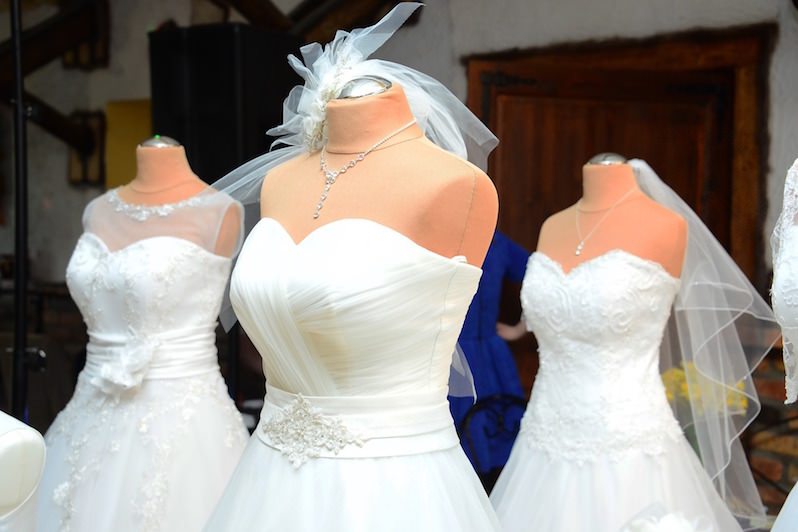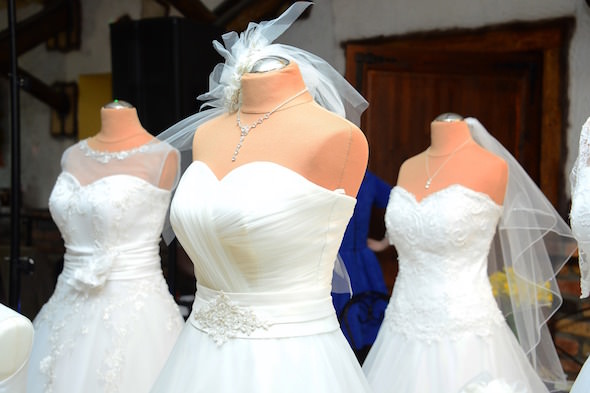Dressing Up Human Trafficking in a Bridal Gown
Many women who participate in the international marriage market go from "mail-ordered" to "male-ordered," becoming commodities in an inherently unequal transaction based on money, sex and power.

Here come the mail-order brides: As many as 15,000 women are entering the U.S. from other countries by way of international dating agencies, according to estimates. (goszka / Pixabay)
KIEV, Ukraine—I press the buzzer next to the sign on the shabby building and am told by Veronica to come to the fourth floor. On the way up, I pass offices advertising everything from legal services to packing crates.
I walk into a long room containing little except Veronica, the business manager, her old computer and lots of cuddly toys for sale. The walls are decorated with wedding photographs, and on Veronica’s desk is a pile of applications from men looking for Ukrainian women to marry and take out of the country.
Welcome to the world of marriage for sale.
Men’s desire for mail-order brides can be traced back to the settlement and development of North America. The majority of immigrants who traveled to the western United States to mine gold and work on the railroads were men. Predominantly male immigrant communities developed throughout the United States, and the relative lack of women created a demand for female immigrants. Today, the mail-order bride business is a multibillion-dollar industry built on servile marriages, trafficking, prostitution, sexual violence and racist stereotypes. Women from impoverished countries are marketed to older men in industrialized Western nations. It is estimated that 15,000 women a year enter the U.S. via international dating agencies.
Ukraine, the Philippines, Thailand and China are some of the main source countries for trafficking in marriage. I visit Ukraine, a conflict-ridden, impoverished nation that is home to hundreds of marriage brokers.
As I talk to Veronica, who is happy to share information about the business with me despite the fact that I am a reporter, a customer turns up, hoping to meet his “date,” with whom he has been corresponding on Skype and by email for three months.
Robert, from Delaware, is a presentable, polite man in his mid-60s, who tells me he has been looking for a Ukrainian bride for four years. I ask why he favors Ukrainian women, and he says, “They have a little bit better fit here for what old-style America is about. The women’s lib gave [U.S. women] a bigger field. You can’t blame them either; they made themselves happy in life with what they’re doing—they choose to go that way rather than be a homebody type of person.”
Robert says he is looking for a woman “around 30 to 40,” but that most of the women advertised on the sites are younger than this. I asked whether he considers the marriage brokers similar to pimps.
No, he says. “Don’t get me wrong, there’s a lot of prostitution here. Venereal disease in Ukraine is higher than anywhere,” Robert says. “I’ve had cab drivers say, ‘I can take you to a lady right now.’ I want a real lady. I’m not looking for that type of stuff.
“There’s a lot of these women, they’ve done wrong, but they deserve a fair chance. I feel they have more of a fair chance by meeting a man from another country and getting away from it all … where their reputation is left behind.”
Many customers complain of being cheated and say that most agencies try to scam them.
“I had one [woman] I was writing to for three months, and the whole time things were just not making sense,” Robert says. “I asked them to send me some photos and they did. I knew the photos they sent me weren’t from the area. [T]hey said they were, and I questioned this. [I discovered] it was an 18-year-old guy from Ghana writing me those letters, and he was doing it because he was getting paid by the site.”
I meet James, a young man in Kiev who has worked for one agency for 18 months, posing as a potential bride and writing emails to male customers. But James tells me he has also written letters on behalf of women who are genuinely signed up with the agency, as well as those who only exist in the imagination of the customer. “They see a photo that sometimes has been bought from a woman hoping to make a few dollars, and from then on, correspond with the likes of me,” James says. “The agency makes as much money off [the customer] as they can. Every time an email is sent or received, it costs him money.”
The women’s email addresses cost between $10 and $15, and translation usually costs another $10 to $15 per email. A face-to-face meeting will cost the customer around $100, and the translator to accompany them, another $100. A man can end up paying as much as $50,000 in his quest for a bride. The women signed up at the agency earn no money from it. There is a lot of money in the marriage trade, but almost all of it goes to the brokers.
I spoke to Marta Gosovska, a former student in Ukraine who was paid by a marriage agency to translate letters between men and potential brides.
“The women were very young, very beautiful, badly educated,” Gosovska says. “Most none of them spoke English, and used only nouns and simple verbs. The men were almost all over 40, in bad physical condition, overweight—I was 22 and horrified that someone would want to have a relationship with such a person.”
Gosovska tells me about a 70-year-old Canadian man who “auditioned” 11 women at the same time in his hotel room in order to choose a bride. “He was a desperate person wishing to find himself … not a partner, but a housewife to look after his house and iron his trousers, and have sex whenever he wanted.”“One man asked me who of the 12 women he was interested in had children because … he was looking for an easier way to connect with women,” Gosovska says. “These men know the women with children are more vulnerable.”
Gary Swierski is only one man who has murdered his mail-order bride. There are endless stories about domestic violence and sexual assault experienced by the women who are married off by these services. One report from Australia, a destination for mail-order brides, found that women from the Philippines aged 20 to 39 were six times more likely to be victims of violence than their local counterparts.
I contacted a former mail-order bride via a support project for migrant women in North America.
Kamon (not her real name) married Dave, a former Marine from Chicago, but escaped soon after she was brought from Thailand to the U.S.
“I was a dancer in a bar [in a suburb of Bangkok], and the manager told me I would get lots of money from dating rich American men by joining his bride agency,” Kamon tells me over the telephone. “I was in trouble with money, so when I met Dave and he told me he would take care of me, I did not even think. I just agreed to go home with him.”
What happened next, says Kamon, was “like my worst nightmare.” Trapped in a small town thousands of miles from home and unable to speak much English, Kamon became depressed, which “made [Dave] hate me.”
“He wanted sex when he wanted it, food when he wanted. If I cried he would shout at me, and I had to do what he told me because he said he could have me deported back to Thailand,” Kamon says. “The man I met [in Thailand] disappeared as soon as he got home.”
Eventually, Kamon received support from a neighbor and was able to escape. She is now attempting to rebuild her life, but feels she cannot return to Thailand. “Everyone will see me as a failure, and I will not be able to marry again. In my country, I am spoiled goods.”
Conditions for women in some countries remain bleak, and as long as women have few prospects for a good match at home, they will look elsewhere for someone to start a family and a new life with.
Alberto is a marriage broker in the Philippines. During a Skype call, he says, “Most of our women have been married, most have children. They are not emancipated like Western women.”
“Many of my [male] clients say that they have been married since they were 20 years old and that all of a sudden the wife wanted to get divorced and gets a lot of money from the husband, and she doesn’t want to be committed anymore to the relationship,” Alberto says. “It’s hard for him to find a woman to start a relationship.”
Donna Lee, a researcher in the U.S. and the Philippines, has studied violence against women in the context of the marriage industry. According to her, the male customer considers the mail-order bride ideal because she is a good housekeeper and is sexually compliant, thereby fulfilling classic male fantasies about female servitude. The mail-order bride, in this mindset, becomes the interface between prostitution and domestic servitude.
Alla is the owner of a marriage agency in Vinnytsa, a small town 155 miles from Kiev. I meet her at her agency’s Kiev office, located on a side street in an old building that has seen better days. Alla tells me customers from England are specifically looking for women who are not feminist.
“They say women in England don’t care about children or husbands or families,” Alla says. “They don’t want to cook or clean. They told me women in Ukraine are more attractive and pay more attention to their outlook and how they dress; they wear high heels and make up; [they are] family-oriented and beautiful, and have a desire to move to a more high-level living country.”
As Robert and I leave the other agency I visited in Kiev, he admonishes Veronica because his “date” is out of the country: “It ain’t good for business.” I ask how he feels about the fact that his potential wife may view marrying him as “just business.”
“At least I know I can take her away from hardship,” he says.
Marriages built on control, abuse and exploitation have the potential to become classic domestic violence cases. But because the bride is literally purchased by her spouse, the narrative changes to reflect a common male fantasy. These “male-ordered” marriages often are romanticized in the same way that the film “Pretty Woman” is presented as a “love story.”
On my last morning in Kiev, I meet with Robert at his hotel. He tells me how much he has spent so far during his trip; despite all his expenses, he has met only one potential bride. We meet in the hotel restaurant during breakfast service, and a Swedish man, pouring himself coffee, overhears our conversation. Ignoring me, he nods toward Robert. “Go to Thailand, man,” the Swede says. “They’re cheaper, sexier, and they never complain, not like the ones here. They are just out for your money.”
The existence of an industry designed to market and sell human beings is tantamount to exploitation and degradation. This remains true regardless of any consent, actual or alleged, on the part of the woman being sold. “It was torture,” Kamon tells me. “I thought it would be better than selling myself in bars, but I ended up being a full-time prostitute and slave. I weep for other women who think this is a good idea.”
Independent journalism is under threat and overshadowed by heavily funded mainstream media.
You can help level the playing field. Become a member.
Your tax-deductible contribution keeps us digging beneath the headlines to give you thought-provoking, investigative reporting and analysis that unearths what's really happening- without compromise.
Give today to support our courageous, independent journalists.









You need to be a supporter to comment.
There are currently no responses to this article.
Be the first to respond.